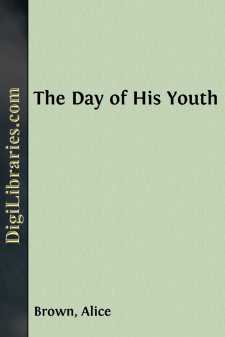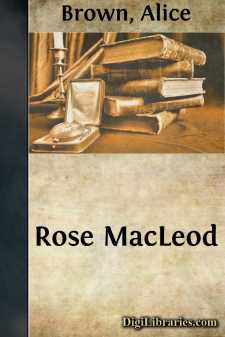Categories
- Antiques & Collectibles 13
- Architecture 36
- Art 48
- Bibles 22
- Biography & Autobiography 813
- Body, Mind & Spirit 142
- Business & Economics 28
- Children's Books 15
- Children's Fiction 12
- Computers 4
- Cooking 94
- Crafts & Hobbies 4
- Drama 346
- Education 46
- Family & Relationships 57
- Fiction 11828
- Games 19
- Gardening 17
- Health & Fitness 34
- History 1377
- House & Home 1
- Humor 147
- Juvenile Fiction 1873
- Juvenile Nonfiction 202
- Language Arts & Disciplines 88
- Law 16
- Literary Collections 686
- Literary Criticism 179
- Mathematics 13
- Medical 41
- Music 40
- Nature 179
- Non-Classifiable 1768
- Performing Arts 7
- Periodicals 1453
- Philosophy 64
- Photography 2
- Poetry 896
- Political Science 203
- Psychology 42
- Reference 154
- Religion 513
- Science 126
- Self-Help 84
- Social Science 81
- Sports & Recreation 34
- Study Aids 3
- Technology & Engineering 59
- Transportation 23
- Travel 463
- True Crime 29
The Day of His Youth
by: Alice Brown
Description:
Excerpt
The life of Francis Hume began in an old yet very real tragedy. His mother, a lovely young woman, died at the birth of her child: an event of every-day significance, if you judge by tables of mortality and the probabilities of being. She was the wife of a man well-known among honored American names, and her death made more than the usual ripple of nearer pain and wider condolence. To the young husband it was an afflicting calamity, entirely surprising even to those who were themselves acquainted with grief. He was not merely rebellious and wildly distraught, in the way of mourners. He sank into a cold sedateness of change. His life forsook its accustomed channels. Vividly alive to the one bright point still burning in the past, toward the present world he seemed absolutely benumbed. Yet certain latent conceptions of the real values of existence must have sprung up in him, and protested against days to be thereafter dominated by artificial restraints. He had lost his hold on life. He had even acquired a sudden distaste for it; but his previous knowledge of beauty and perfection would not suffer him to shut himself up in a cell of reserve, and isolate himself thus from his kind. He could become a hermit, but only under the larger conditions of being. He had the firmest conviction that he could never grow any more; yet an imperative voice within bade him seek the highest out-look in which growth is possible. He had formed a habit of beautiful living, though in no sense a living for any other save the dual soul now withdrawn; and he could not be satisfied with lesser loves, the makeshifts of a barren life. So, turning from the world, he fled into the woods; for at that time Nature seemed to him the only great, and he resolved that Francis, the son, should be nourished by her alone.
One spring day, when the boy was eight years old, his father had said to him:—
"We are going into the country to sleep in a tent, catch our own fish, cook it ourselves, and ask favors of no man."
"Camping!" cried the boy, in ecstasy.
"No; living."
The necessities of a simple life were got together, and supplemented by other greater necessities,—books, pictures, the boy's violin,—and they betook themselves to a spot where the summer visitor was yet unknown, the shore of a lake stretching a silver finger toward the north. There they lived all summer, shut off from human intercourse save with old Pierre, who brought their milk and eggs and constituted their messenger-in-ordinary to the village, ten miles away. When autumn came, Ernest Hume looked into his son's brown eyes and asked,—
"Now shall we go back?"
"No! no! no!" cried the boy, with a child's passionate cumulation of accent.
"Not when the snow comes?"
"No, father."
"And the lake is frozen over?"
"No, father."
"Then," said Hume, with a sigh of great content, "we must have a log-cabin, lest our bones lie bleaching on the shore."
Next morning he went into the woods with Pierre and two men hastily summoned from the village, and there they began to make axe-music, the requiem of the trees. The boy sat by, dreaming as he sometimes did for hours before starting up to throw himself into the active delights of swimming, leaping, or rowing a boat. Next day, also, they kept on cutting into the heart of the forest. One dryad after another was despoiled of her shelter; one after another, the green tents of the bird and the wind were folded to make that sacred tabernacle—a home. Sometimes Francis chopped a little with his hatchet, not to be left out of the play, and then sat by again, smoothing the bruised fern-forests, or whistling back the squirrels who freely chattered out their opinions on invasion. Then came other days just as mild winds were fanning the forest into gold, when the logs went groaning through the woods, after slow-stepping horses, to be piled into symmetry, tightened with plaster, and capped by a roof. This, windowed, swept and garnished, with a central fireplace wherein two fires could flame and roar, was the log-cabin. This was home. The hired builders had protested against its primitive form; they sighed for a snug frame house, French roof and bay windows. "'Ware the cold!" was their daily croak.
"We'll live in fur and toughen ourselves," said Ernest Hume. And turning to his boy that night, when they sat together by their own fire, he asked,—
"Shall we fashion our muscles into steel, our skin into armor? Shall we make our eyes strong enough to face the sun by day, and pure enough to meet the chilly stars at night? Shall we have Nature for our only love? Tell me, sir!"
And Francis, who hung upon his father's voice, even when the words were beyond him, answered, "Yes, father, please!" and went on feeding birch strips to the fire, where they turned from vellum to mysterious missals blazoned by an unseen hand....








